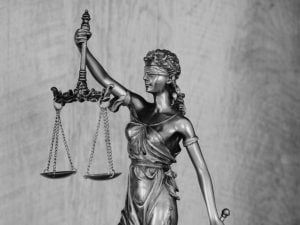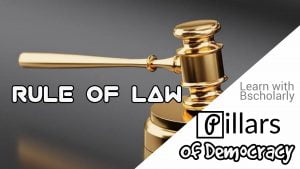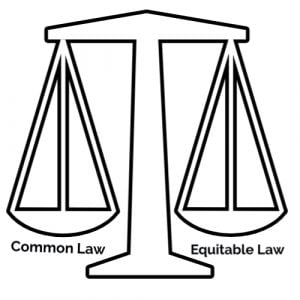Meaning, Features and Characteristics of rule of law: The Rule of Law is an ancient concept which has been recognized and adopted by different societies at different points in history. Though a concept of ancient origin, it remains relevant to every political society today. Its relevance to the existence and development of the human society has become more pronounced with the popularisation and the adoption of the democratic system of government by different countries. It is therefore necessary to examine the meaning and characteristics of the rule of law.

Recommended: How to prepare and pass scholarship examinations excellently
Meaning of Rule of Law
The Rule of Law has been ascribed various meanings. Institutions, scholars and philosophers such as Aristotle, Bracton, Friedman and others have defined and explained the Rule of Law differently.
Aristotle was one of the ancient and notable proponents of the Rule of Law. According to him, the law and not the whims and caprices of man should govern the human society. The rule of law should be preferred to the rule of man. Aristotle posits that “the rule of law is preferable to that of any individual“.
Bracton, a British writer, was also a proponent of the Rule of Law. He believed that the world is governed by law. Such law may be made by man or may be divine laws. According to Bracton, the king is made by the law and should be subject to the law and God only.
The Rule of Law requires that the government and the citizens carry out their activities in accordance with the stipulations of the law. This means that whatever the government does must be in line with the provisions of the law. Similarly, the citizens must also, in their interactions with each other and the government, obey the laws of the country. In essence, the rule of law implies that the law regulates the conduct of the government and the citizens.
Also see: Meaning, Advantages and disadvantages of Judicial Precedence
Top 3 Major Characteristics of the Rule of Law
Despite the efforts of various scholars, the meaning and features of the rule of law were not clearly established before 1885. In 1885, Professor A. V Dicey clearly defined and elucidated the meaning of the rule of law. According to A. V Dicey, there are three aspects, characteristics or elements of the rule of law. These three characteristics or aspects of the rule of law will be discussed.
1. Supremacy of The Law: AV Dicey posits that the rule of law means that the law is supreme. Accordingly, the regulation of human life and conduct should not be by arbitrary power of the government. By virtue of this aspect of the rule of law, a citizen should not be punished for his act or omission except in accordance with the provisions of the law.

Again, the supremacy of the law means that a citizen should not be subject to any punishment except that sanctioned by a court or tribunal established by law. The government should not have the power to arbitrarily impose a punishment on a citizen.
Where a citizen is alleged to have breached the law, he should not be arbitrarily punished. Rather, he should be tried according to the due process of law. This requires that the citizen be formally charged to a court or tribunal established by law and vested with the legal power to decide the case.
Also see: How to become a successful entrepreneur: 10 Qualities you need
2. Equality before the Law: Another aspect or characteristic of the rule of law is equality before the law. The rule of law denotes that every person and authority in a country is subject to the laws of that country. The law should be made for, and applied to all persons, groups and organs of the government.

The laws of a country should not be made for the benefit of certain persons or group. The law should be made for the good and security of every citizen notwithstanding the political inclination, social or economic status or the ethnicity of the citizen. The lawmaking body must make laws which apply to every class of citizens and which will not, in any way, be detrimental to a particular class of citizens.
Also, the administration or enforcement of the law should be commonly applied to all persons and authority. The law should not be enforced in a discriminatory manner. Rather, it should be enforced without prejudice to any person or group. The government and the citizens must be controlled by the law. Where any department of the government or any person violates the provisions of the law, the citizens or the government should be able to enforce the law against the government or citizen concerned.
For instance, a citizen who alleges that his rights have been infringed upon by the government should be allowed to take legal action against the government. On the other hand, if a private citizen violates the criminal law of the land, the government must enforce the provisions of the criminal law against the citizen without being constrained by considerations of his or her ethnicity or status.
Equality before the law is guaranteed by several international laws. These include the International Covenant on Civil and Political Rights, the African Charter on Human and Peoples Rights and the United Nations Declaration of Human Rights.
Article 26 of the International Covenant on Civil and Political Rights provides that all persons are equal before the law and are entitled without any discrimination to the equal protection of the law. Article 3 of the African Charter on Human and Peoples Rights and Article 7 of the United Nations Declaration of Human Rights also prohibit discrimination and guarantee equality of all persons before the law.
Recommended: Ways of promoting popular participation in politics
3. Government Activities carried out within the Framework Of The Law
The third aspect or characteristic of the rule of law is that the activities of the government must be carried out within the framework of the extant laws and regulations of the country. Simply put, the rule of law means that whatever the government does must be done within the boundaries set by the law or regulations.
The Constitution and various laws made by the legislature usually vest specific powers on the different agencies or departments of the government. This may be a power to make policies, execute the law or execute a project. The rule of law requires that the agency which has been vested with such power exercise it only to the extent permitted by the law. Where the law stipulates that the agency exercising the power should not do a particular act, then the agency must avoid doing the act which it has been prohibited from doing.
In carrying out the functions assigned to it by the law, the government must fulfil the requirements of the law. Where the law demands that the function should be carried out in a particular way, then the government must carry out the function in the exact way prescribed by the law.
For example, if the Constitution requires that a policy should be formulated after consultation with the citizens, then the policy should only be made when the citizens have been consulted. In some cases, the law may require that the function or power of a government be carried out or exercised at a particular time. In such cases, the function should only be performed and the power exercised at the time stipulated.
In any society where the rule of law is observed, these features or characteristics must be present and operational. Their degree of effectiveness determines the extent of the observance of the rule of law in the territory concerned.
Also see: Exceptions to Hearsay Evidence in Law
In conclusion, it is pertinent to know that rule of law has become a generally accepted ideal or standard. Most countries of the world have adopted the principles of the rule of law. The adoption and observance of the rule of law ensures that the conduct of the government and the citizens do not fall short of the standards of the country’s laws and regulations. It also guarantees the protection of the rights of the citizens by restricting the government from exercising arbitrary powers or abusing its legal powers.
The rule of law has its characteristics, aspects or features. These characteristics or features are the markers which reflect the operation of the rule of law. The existence and the degree of operation of these features or characteristics determines whether the rule of law exists and operates effectively in a territory or not.

Edeh Samuel Chukwuemeka, ACMC, is a lawyer and a certified mediator/conciliator in Nigeria. He is also a developer with knowledge in various programming languages. Samuel is determined to leverage his skills in technology, SEO, and legal practice to revolutionize the legal profession worldwide by creating web and mobile applications that simplify legal research. Sam is also passionate about educating and providing valuable information to people.